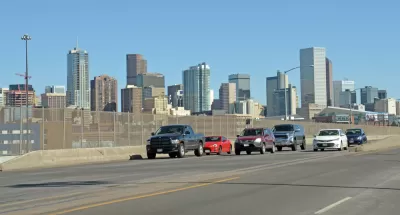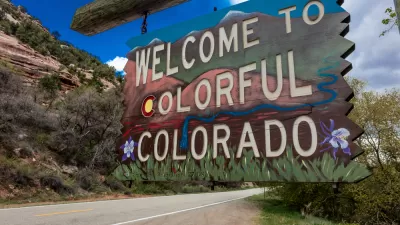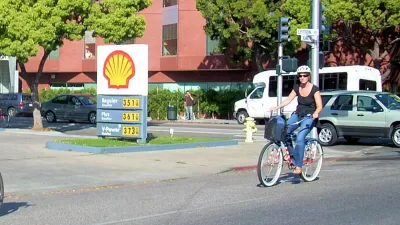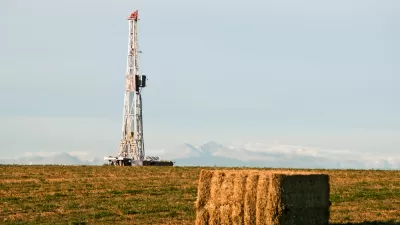Two transportation bonding initiatives will appear on the ballot on Nov. 6: A $3.5 billion measure would have debt repayments come from the general fund, while a $6 billion initiative would create a revenue stream by hiking sales taxes.

Colorado voters will be given a clear choice on transportation funding options on Nov. 6, somewhat similar to two conflicting ballot initiatives on oil and gas drilling. Do they want to have the state fund more road repair without raising additional revenue or pay for over twice the amount of road repair, plus allow funding for other modes, by issuing revenue bonds paid from a new sales tax measure?
Joe St. George explains the two initiated state statutes on Sept. 3 for KDVR.com (newscast video available):
Fix Our Damn Roads or Proposition 109 will appear on the ballot. It demands the state pass no new taxes for transportation. Instead it encourages lawmakers to use current funding for $3.5 billion in transportation bonds.
Let's Go Colorado or Proposition 110 is a transportation measure aimed at increasing the state sales tax .62 percent. That means a $100 purchase will cost 62 cents more. Supporters say it will raise more than $6 billion dollars for transportation needs with over $700 million in new revenue being created in the first year.
The organizer for Prop. 109, recently known as Initiative 167 [pdf], is Jon Caldara, a Denver Post columnist and president of the Independence Institute, a conservative-libertarian think tank, who has "long been among the shrewdest anti-tax rabble-rousers in Colorado politics," reports The Denver Post's Jon Murray in the source article.
The initiative "would mandate a more modest one-time boon strictly for high-priority road projects" and "would leave it to legislators to figure out how to repay up to $3.5 billion in authorized bonds, over 20 years, from the state budget (which is currently $29 billion a year)."
Caldara says his measure would force a long-overdue reckoning of the state’s competing priorities, meaning that legislators may have to cut spending elsewhere.
Prop. 110, recently known as Initiative 153, backed by five major groups, "would raise the state’s sales-and-use tax from 2.9 percent to 3.52 percent for a 20-year-period, starting in 2019," reports Ben Botkin for The Post. It "would raise a projected $20 billion over two decades, to be split among state highways, local projects and transit initiatives," adds Murray. "The state could borrow up to $6 billion upfront."
"A 'YES' vote requires the state to divvy up the new money as follows," reports Marshall Zelinger of KUSA TV (newscast video available) on Aug. 24:
- 45 percent: Colorado Department of Transportation (CDOT)
- 40 percent: Local Governments
- 15 percent: Multimodal projects [including bike lanes and sidewalks, as well as transit]
By contrast, under Prop. 109, "the money CDOT borrows can only be used to fund these 66 projects [pdf]," adds Zelinger. Furthermore, they amount to $5.6 billion, which is $1.6 billion more than the measure would authorize, he notes.
The initiative is similar to a legislative initiative attempted last year that died due to Republican opposition. Due to Colorado’s Taxpayer Bill of Rights, all tax hikes must be approved by statewide vote, which explains why sales taxes rather than gas taxes are considered – they poll better.
The biggest eye-opener may be that should $3.5 billion bond initiative pass, the net total in new road spending would be $1 billion due to Senate Bill 1 and Senate Bill 267, which would reduce revenue from two other sources, explains Zelinger in detail.
Finally, Joe St. George explains that both measures can pass and fail. While the "Lets Go Colorado" campaign has more funding, Prop. 109 is polling better, he adds.
Related posts:
-
Transportation Sales Tax Advances in Colorado Legislature, March 24, 2017A bill to ask voters in November to increase the state sales tax by 0.62 percent to fund transportation projects passed its first House committee March 22 on a partisan vote, with Democrats in support and Republican opposed.
-
Colorado Floats Sales Tax for Transportation, September 11, 2013A transportation study group is rolling out a proposal to place a .7%, 10-year general sales tax on the 2014 ballot with two-thirds of the revenue going for roads and one-third for transit. The state's 22-cent gas tax hasn't been raised since 1991.
FULL STORY: Colorado voters’ transportation options, broken down. Hint: It’s not as simple as whether to raise taxes.

Alabama: Trump Terminates Settlements for Black Communities Harmed By Raw Sewage
Trump deemed the landmark civil rights agreement “illegal DEI and environmental justice policy.”

Study: Maui’s Plan to Convert Vacation Rentals to Long-Term Housing Could Cause Nearly $1 Billion Economic Loss
The plan would reduce visitor accommodation by 25% resulting in 1,900 jobs lost.

Planetizen Federal Action Tracker
A weekly monitor of how Trump’s orders and actions are impacting planners and planning in America.

Wind Energy on the Rise Despite Federal Policy Reversal
The Trump administration is revoking federal support for renewable energy, but demand for new projects continues unabated.

Passengers Flock to Caltrain After Electrification
The new electric trains are running faster and more reliably, leading to strong ridership growth on the Bay Area rail system.

Texas Churches Rally Behind ‘Yes in God’s Back Yard’ Legislation
Religious leaders want the state to reduce zoning regulations to streamline leasing church-owned land to housing developers.
Urban Design for Planners 1: Software Tools
This six-course series explores essential urban design concepts using open source software and equips planners with the tools they need to participate fully in the urban design process.
Planning for Universal Design
Learn the tools for implementing Universal Design in planning regulations.
Caltrans
Smith Gee Studio
Institute for Housing and Urban Development Studies (IHS)
City of Grandview
Harvard GSD Executive Education
Toledo-Lucas County Plan Commissions
Salt Lake City
NYU Wagner Graduate School of Public Service





























